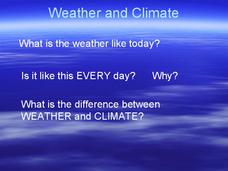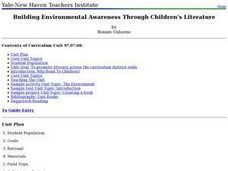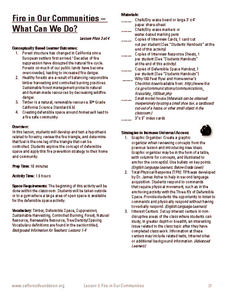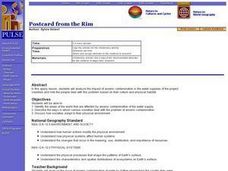Desert Discoveries
What's the Buzz on Native Bees?
Young biologists describe the different types of bees that are native to the Sonoran Desert. They look at the nesting and feeding requirements of the insects, and study how they are able to pollinate many plants found in the environment....
Curated OER
Pollution or Prevention?
Students examine potential contamination on the environment due to products and by-products of a new industrial process. Students conduct a lab that explores the economic differences between choices of pollution cleanup and prevention.
NOAA
Deep-Sea Ecosystems – Life is Weird!
A pool of brine in the deep sea can be up to four times as salty as the surrounding sea water. The deep sea ecosystem relies on chemosynthesis and the organisms that live there are often strange to us. The lesson focuses on researching...
Chicago Botanic Garden
Introducing Ecosystem Services
Purifying air and water, providing soil in which to grow crops, and moving water through its natural cycle are all services an ecosystem provides that benefit humans. Lesson four in a series lets learners explore and discuss the value of...
Science Matters
Eruptions and Volcano Types
The Mammoth Lakes area regularly releases warnings to hikers and skiers to be careful because melting snow releases trapped gases from volcanic vents. The 17th lesson plan in the 20-part series opens with a demonstration of carbon...
Novelinks
The Giver: Guided Imagery
Guide your class through the imagery of Lois Lowry's The Giver with a peaceful meditative experience. After you create a serene environment in your class, read through a provided script in which kids sift through their favorite...
Bethel School District
Observations and Inference
What's the difference between qualitative and quantitative observations? Learners make observations, inferences, and predictions about their environment with a set of questions and activities that are applicable to either language...
Teach Engineering
Dress for Success
Dressing for success is not always about looking sharp. Sometimes it is about staying warm and dry. Present your class with an activity that challenges groups of pupils to design a layered material for blizzard conditions. The teams test...
Centers for Disease Control and Prevention
Understanding the Epidemiologic Triangle through Infectious Disease
Introduce infectious diseases and the epidemiologic triangle. A helpful resource describes the agent, host, and environment from the three vertices as well as the time factor, which is in the middle. Scholars complete a simple...
Curated OER
Weather and Climate
It's hot today, but is that the weather or the climate? This colorful presentation isolates both concepts to allow for better understanding by covering the positioning of the planet, making comparisons of land versus water, and looking...
Florida International University
Designing an Autonomous Underwater Vehicle (AUV): Concepts in Lift, Drag, Thrust, Energy, Power, Mass, and Buoyancy
Engineer an autonomous underwater vehicle (AUV) to study concepts of physics. Using household materials, collaborative groups design and build an AUV and then test Newton's Laws of Motion as they apply them in underwater environments...
Beyond Benign
Daphnia Bioassay LD50
De-icing materials may have a harmful effect on our environment; have your class perform an experiment to test the nature of these effects. Scholars monitor the survival rate of a sample of daphnia as the concentration of a de-icing...
K12 Reader
Taiga Ecosystems
After reading a short article about taiga ecosystems, middle schoolers are asked to identify the characteristics of this chilly environment.
NOAA
Calling All Explorers
Let's get moving! The second installment of a 2-part series of six adventures helps learners take part in individual explorations by sea and by land. After navigating the waters in an informative WebQuest, groups create and hide their...
NOAA
Animals of the Fire Ice
When the sun's rays can't reach the producers in a food web, where does all the energy come from? Extreme environments call for extreme food sources. Young scientists investigate creatures that appear to get their energy from methane...
Curated OER
Environmental Awareness and Children's Literature
Use an alternative setting for pregnant teens and young mothers, as well as special education children to examine environmental topics through literature. Included in this unit is a visit to neighborhood libraries to select children's...
Curated OER
Classroom Aquaponics: Exploring Nitrogen Cycling in a Closed System
Students investigate nutrient cycling in a simplified desktop ecosystem involving aquarium and hydro-ponically grown plants. They set up an aquarium with 10 gallons of water at least a week before the lab is planned and place...
Curated OER
Bursting Blooms- Create an Early Spring
Young scholars prune a tree. In this gardening lesson, students select a shrub or tree that has a lot of flower buds and use sharp pruners to cut sections of branches. Young scholars place the cuttings into cool water and...
Curated OER
Google Earth Geology Field Trip
Students take a virtual field trip around California using Google Earth. In this geology field trip lesson, students explore landforms and a variety of rocks located in California. Students compare environments where rocks are...
Curated OER
Dirt Babies
Dirt babies are an excellent way to show young botanists the plant life cycle. They explore the functions and industry behind grasses before growing some of their own. Use the informational text here and consider implementing some...
Forest Foundation
Fire in Our Communities - What Can We Do?
Learn about defensible space and renewable resources with a lesson about forest fires. After exploring the ways that humans have impacted the environment, kids conduct mock interviews about differing points of view in the conservation...
Curated OER
My Planet Earth
The earth is a delicate and fragile thing; Why not engage your class in a craft project that will make them aware of our environment? Earth Day is celebrated as recycled materials are used to create earth window hangings. Crayons are...
Curated OER
Semipermeable Membranes and Bioaccumulation
Beginning biologists place a drop of food coloring into water of differing temperatures to observe the effect on the diffusion rate. They remove the shells from raw eggs and then experiment with osmosis over the remaining membranes....
Curated OER
World Geography: Postcard from the Rim
Students are able to identify the areas of the world that are affected by arsenic contamination of the water supply. They are able to describe the ways in which various societies deal with the problem of arsenic contamination. ...
Other popular searches
- Environmental Health Water
- Environmental Laws Water
- Environmental Science Water
- Water, Environment,worksheets
- Conserving Water Environment
- Environmental Water
- Environment Water Use
- Environmental Waste Water
- Environment Water
- Environment and Water
- Environment Water Cycle























